


The IT sector has opened doors to numerous career paths, with quality assurance (QA) testing emerging as one of the most vital roles. The market reflects this importance, growing from 5.3 billion USD in 2024 to an expected 12.9 billion USD by 2031, growing at a CAGR of 11.2% during the forecast period 2024-2031. Even companies well-versed in technology find that creating successful IT products isn’t simple—it takes meticulous planning, precise coding, and thorough testing to deliver excellence. A single quality oversight can damage a company’s reputation and market position, which is precisely why successful businesses prioritize QA engineering in their development process.
Demand for QA engineers is growing faster than average: US employment of QA analysts and testers is projected to rise 17% from 2023 to 2033, compared to 4% for all occupations. This acceleration highlights the increasing recognition of quality assurance as a critical business function. Meanwhile, the pool of available candidates is shrinking — 91% of small businesses report few or no qualified applicants for open roles and organizations face a QA talent shortage that threatens security and delivery timelines. This gap between supply and demand creates significant challenges for companies seeking qualified testing professionals. For organizations navigating this competitive talent landscape, understanding effective recruitment strategies becomes essential to building capable testing teams that can safeguard product quality and business reputation.
Finding skilled QA engineers is vital to IT product success. These professionals maintain high standards through systematic testing and quality control measures. Through careful testing methods and defect detection, QA engineers support the development process from start to finish. A common misconception in modern app development is that test coverage must reach 100%. In reality, aiming for complete test coverage is counterproductive and slows down development. Mature teams focus on automating tests for the most important parts of their system, striking a balance between thoroughness and efficiency. This article includes the essentials for finding and working with QA professionals. We’ll explore what makes a great QA engineer, share proven hiring strategies, and examine top agencies in the field.
Quality assurance (QA) engineers check and verify software quality during each stage of development. From the first planning meeting to the final product launch, they ensure everything works as it should. Their daily work includes running different tests—checking small code pieces, ensuring other parts work together, and catching any new problems. QA teams work closely with developers, product managers, and company leaders. When they find issues, they report them clearly and help find fixes.
A strong senior tester brings more than just experience running test cases. They should understand the basics of software development, so they can isolate the precise error in a system instead of dumping pages of unnecessary logs. Effective testers also go beyond the immediate issue—they check related parts of the application or page, rather than just confirming a single bug fix and ignoring visible problems in the surrounding area. Extreme attention to detail, analytical thinking, and an affinity for tinkering are traits of great testers. These qualities help them anticipate edge cases and uncover subtle or hidden faults before users do.
The growing use of generative AI in software development has created new challenges for QA teams. Automated code can increase productivity, but it also introduces greater risk:
“AI-generated code often contains more bugs, necessitating extensive quality assurance testing to offset potential productivity gains. As more companies use generative AI, security researchers warn that AI-generated code may contain up to five times as many vulnerabilities, highlighting the need for thorough QA testing before deployment.”
The QA engineering field encompasses several specializations, each contributing unique expertise to the software development lifecycle. Understanding these specialized roles helps organizations build balanced testing teams that address all aspects of quality assurance. The following breakdown highlights the core QA specializations, their primary functions, and the specific business contexts where each provides maximum value.
Approaches like Test Driven Development (TDD) sound ideal in textbooks or training sessions, but in fast-paced, high-growth startup environments, TDD often proves impractical. The need for speed and flexibility typically outweighs the theoretical benefits of strict TDD practices. This specialized knowledge enables companies to make informed decisions when building their quality assurance capabilities.
| Aspect | Entry-Level | Mid-Level | Senior-Level |
|---|---|---|---|
| Primary focus | Follow test cases, report bugs, and verify fixes. | Design test plans, lead execution, and review test coverage. | Define QA strategy, manage team efforts, and ensure overall product quality. |
| Tools used | JIRA, TestRail, Excel. | All entry tools plus Confluence, Git basics. | All mid-level tools plus QA dashboards, CI/CD oversight. |
| Daily tasks | Execute assigned tests, log bugs, and update documentation. | Write new test cases, conduct exploratory testing, and review peer work. | Set QA priorities, lead communication with stakeholders, and monitor QA performance. |
| Coding knowledge | Not required. | Basic SQL or scripting knowledge is useful. | Understands test frameworks; may review or guide automation efforts. |
| Key metrics | Test execution rates, bug reports, and defect rejection rate. | Test coverage, defect detection rate, and test case quality. | Defect density, defect leakage, test effectiveness. |
| Certifications | ISTQB Foundation, CSTE. | ISTQB Advanced, Agile Tester, CSTE. | ISTQB Test Manager, CSQA, optional PMP or ScrumMaster. |
The field of QA engineering includes several specialized roles, each bringing unique value to software quality:
These QA professionals manually test the software, clicking through apps and websites to spot problems. They follow test plans to check every part of the software, including UI/UX design elements for usability and visual consistency. Think of them as software detectives who look for bugs and glitches that might bother users. Manual testers are particularly valuable in:
Do you have IT recruitment needs?
These specialized QA professionals develop scripts and frameworks that execute systematic testing procedures programmatically. They implement code-based solutions that automate repetitive test scenarios, significantly increasing efficiency and coverage while reducing human error. Automation engineers bridge the gap between development and quality assurance by creating sustainable testing architectures that scale with application complexity. They are essential for:
These QA experts check how well software performs under pressure. They test how many users a system can handle, how fast pages load, and whether the software stays stable when many people use it. They also ensure that apps won’t crash during busy times. Their expertise is crucial for:
These specialists hunt for weak software vulnerabilities that hackers might try to exploit. They test password systems, check data protection, and ensure the software follows security rules. Their job is to find and fix security holes before bad actors can exploit them. They are vital for:
While each of these roles focuses on a distinct area of quality assurance, they often collaborate as part of a larger testing strategy. Manual testers uncover usability issues that automation may overlook. Automation engineers build reliable test frameworks that save time and reduce manual effort. For mature applications, it’s critical to have a suite of automated tests that cover the system’s most important components. Development teams should never rely solely on manual testing. New bugs can reappear unexpectedly—even after being fixed once. Regularly testing for these recurring issues, a process known as regression testing, is a cornerstone of quality assurance for long-term stability. Performance testers ensure that applications remain responsive under load, while security specialists guard against vulnerabilities. Together, they form a layered QA approach that strengthens product stability, security, and user satisfaction.
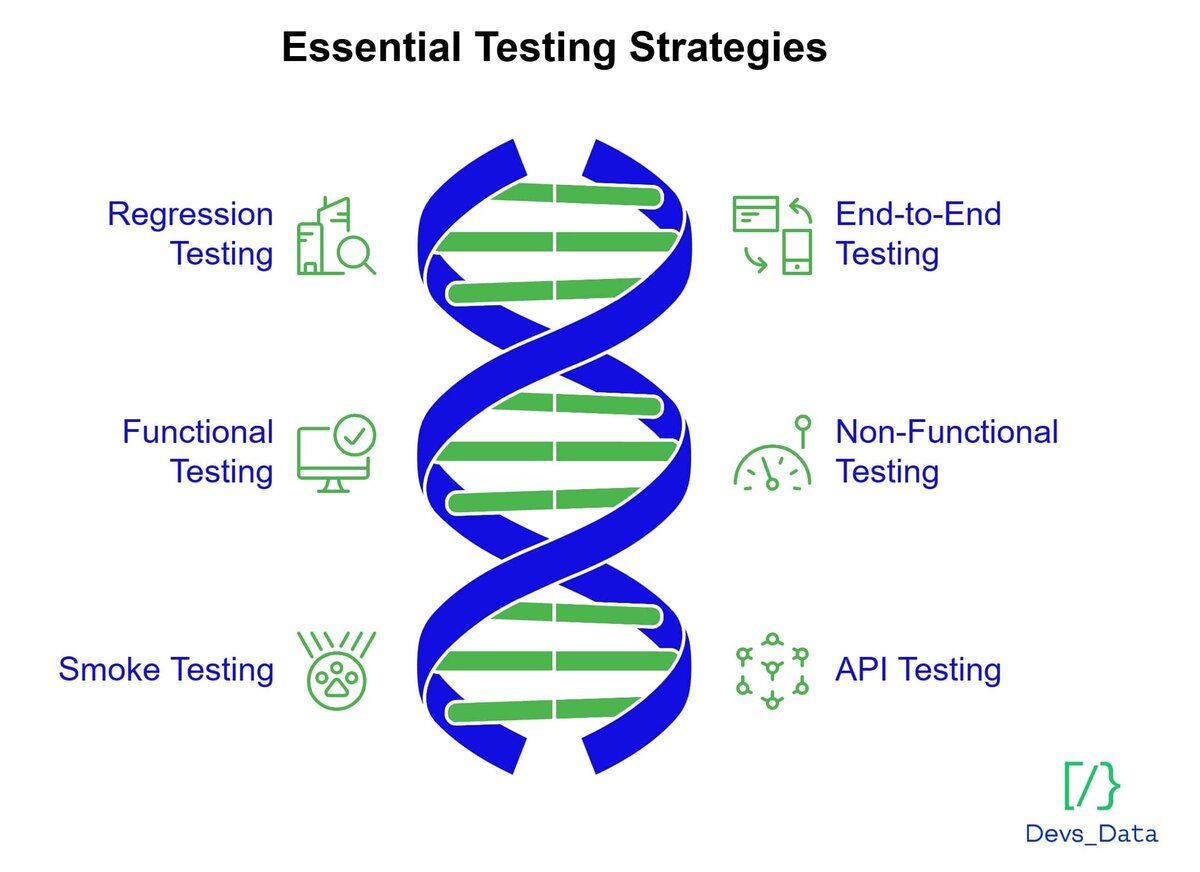
Modern quality assurance relies on various testing methods to ensure software reliability and user satisfaction. Below, we outline a few of the most common approaches every effective QA team should know:
Regression testing checks that new updates or bug fixes haven’t introduced fresh issues elsewhere in the application. It ensures that previously working features remain stable after changes are made.
End-to-end (E2E) testing simulates real user workflows across an application, confirming that various components and integrations work as intended from start to finish. E2E testing is critical for catching issues that might not appear in isolated unit or integration tests.
Functional testing focuses on verifying that specific features or functions of the software perform according to requirements. In contrast, non-functional testing examines performance, usability, accessibility, and security factors determining how well the software works under different conditions.
Smoke testing provides an initial check to determine if the most essential features of an application function correctly. This is often the first round of testing after a new build, designed to catch major failures before more detailed tests are run.
QA professionals use specialized tools and languages for automation to support these testing strategies. Cypress and Playwright are widely used for modern web application testing, offering fast, reliable automation for end-to-end scenarios. Selenium remains a classic choice for cross-browser automation, while Xray provides robust test management and integration with tools like Jira. These solutions enable teams to efficiently create, maintain, and execute complex test suites, increasing coverage and reducing manual effort.
A crucial part of modern QA is API testing, validating the backend services that power applications. Thorough API testing ensures that the data layer and business logic work as expected, supporting both web and mobile clients. Tools like Postman and Insomnia make crafting, automating, and sharing test scenarios for REST APIs easy. Key REST endpoints include POST, GET, DELETE, and PUT, which handle data creation, retrieval, removal, and updating. As software architectures evolve, many teams also work with GraphQL APIs or use gRPC for high-performance, real-time communication, making backend testing even more vital for application stability and scalability.
By combining a thoughtful mix of testing types, using proven automation tools, and placing equal emphasis on backend validation, QA teams help safeguard every layer of modern software systems.
The recruitment of QA professionals requires careful evaluation based on project requirements. Different platforms demand distinct testing approaches. For example, mobile applications need specialists to understand device compatibility and user interface responsiveness, while eCommerce platforms require payment processing and security testing expertise.
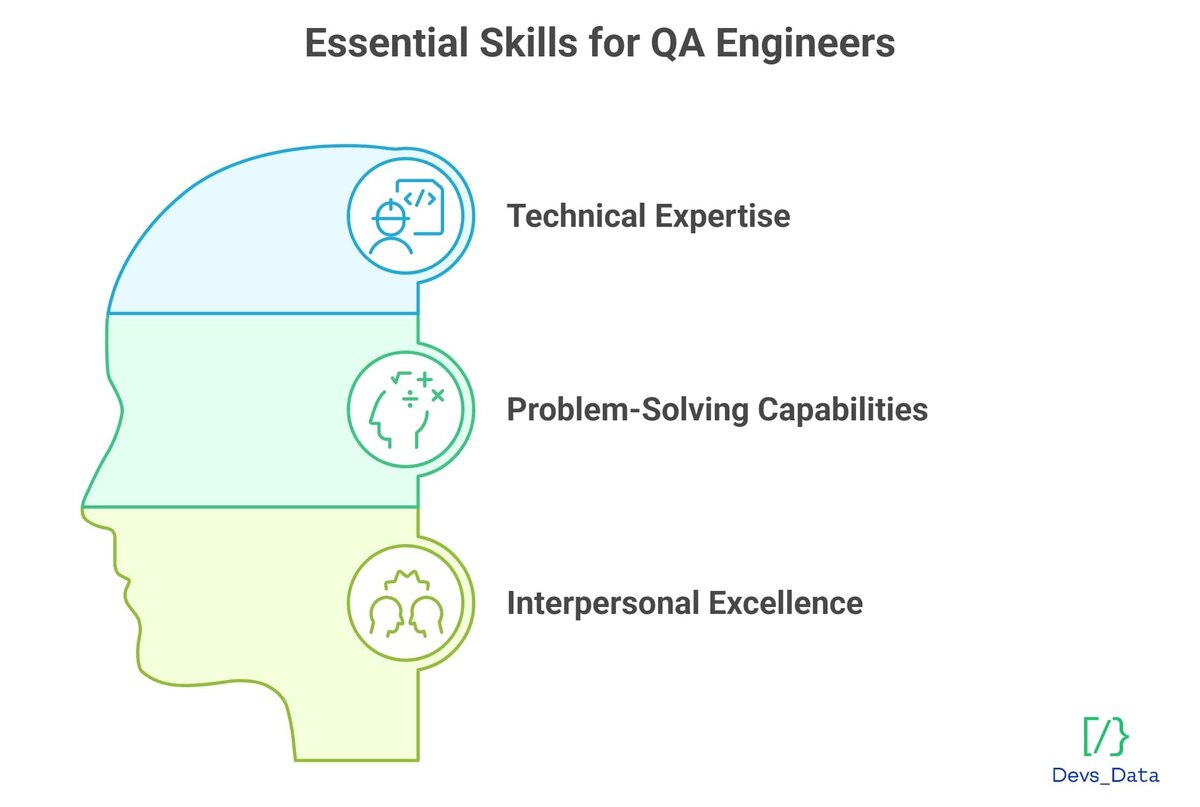
Now, let’s explore the essential competencies that define a practical QA engineer for software testing services across these specialized domains.
Success in quality assurance requires strong technical foundations. Key technical competencies include:
Adequate quality assurance demands sharp analytical skills and methodical problem-solving approaches:
Quality assurance success relies heavily on strong collaboration and clear communication:
Quality assurance forms a core component of modern software development. Professional testing methods identify code weaknesses and security gaps that could create risks. QA teams provide systematic evaluation, allowing companies to address technical issues before they affect operations.
The role of QA has evolved significantly, with processes now beginning at a project’s outset and continuing throughout development. QA engineers are no longer just testers — they act as quality strategists, helping teams prevent issues rather than simply detect them. Market data supports this shift: the US Bureau of Labor Statistics projects QA specialist employment to grow by 25% through 2032, well above average.
Real-world examples highlight the cost of insufficient QA. According to the Financial Times, banks face growing vulnerability due to reliance on outdated IT systems. Between January 2023 and February 2025, Barclays experienced 33 system failures, while HSBC and Santander each reported 32 outages. These disruptions illustrate how inadequate testing and preventative QA measures can severely impact service reliability and customer confidence.
QA services today go beyond basic bug detection. They ensure software meets performance expectations under varying loads, adheres to security protocols, and delivers a consistent user experience. In sectors like finance and healthcare, QA directly supports compliance and risk mitigation. As digital expectations rise, structured QA practices have become essential to maintaining business continuity, user trust, and long-term product value.
Securing exceptional QA professionals demands calculated recruitment efforts within the current competitive hiring environment. Companies need to explore various talent acquisition channels to connect with specialists who demonstrate both superior testing capabilities and compatibility with team dynamics. Below, we present four key recruitment approaches, complete with their specific benefits and limitations, designed to assist organizations in efficiently developing effective QA departments.
| Recruitment Approach | Pros | Cons |
|---|---|---|
| Freelance platforms – Marketplaces like Upwork, Freelancer, and Fiverr connect companies with independent QA professionals worldwide. These platforms feature rating systems, portfolios, and customizable compensation arrangements for project-based testing needs. | Global talent access across diverse specializations. Transparent review systems highlighting performance. Flexible payment structures. | Time zone differences causing communication delays. Integration challenges with existing teams. Inconsistent availability for long-term projects. |
| LinkedIn recruitment – This professional network provides QA talent through detailed profiles showing certifications, skills endorsements, and recommendations. Companies can use advanced filters to find candidates with specific testing expertise and experience. | Comprehensive technical backgrounds with verification. Skill endorsements from industry peers. Targeted search using QA-related keywords. | Requires significant screening time. Lacks standardized skill assessment. High competition for visible candidates. |
| Industry referrals – This approach uses professional networks for recommendations from employees, colleagues, and technical leaders. Personal endorsements identify QA specialists who have demonstrated excellence but might not be actively job seeking. | Pre-vetted expertise from trusted sources. Candidates with proven performance. Higher likelihood of cultural fit. | Limited talent pool size. Network restrictions by industry or location. Potential for homogeneous team composition. |
| Recruitment agencies – Specialized firms offering QA recruitment maintain databases of pre-screened professionals. These agencies handle the entire acquisition process from outreach through assessment and interview coordination. | Thoroughly vetted candidates meeting requirements. Assessment of technical and soft skills. Access to passive candidates not on job boards. | Higher placement fees than direct hiring. Reduced control over the selection process. Varying agency specialization in testing domains. |
Choosing the right recruitment method depends on your project’s scope, urgency, and in-house capacity to screen candidates. While freelance platforms and professional networks offer speed and reach, they often lack the depth of technical assessment needed for critical QA roles. Referrals provide trust but limit scale. For teams seeking thoroughly vetted professionals with both technical and interpersonal strengths, partnering with a specialized recruitment agency offers the most reliable results. DevsData LLC, with its rigorous multi-stage vetting and QA-specific recruitment expertise, stands out as a strong option for companies that prioritize quality, precision, and long-term fit.
The increasing complexity of software development has rendered specialized QA recruitment agencies indispensable partners in cultivating robust testing teams. These firms amalgamate in-depth industry knowledge with expansive talent networks to align companies with the appropriate QA professionals. By comprehending both technical prerequisites and market conditions, they can pinpoint candidates who possess the exact blend of skills required for particular testing roles. Let us examine some of the preeminent companies operating in this domain.
Here are the best 4 recommendations to consider:
Website: www.devsdata.com
Company size: ~60 employees
Founding year: 2016
Headquarters: Brooklyn, NY, and Warsaw, Poland
DevsData LLC is a specialized recruitment agency that connects businesses with expert test automation engineers, manual QA specialists, and performance testing professionals. With 8+ years of experience in the market, their comprehensive understanding of quality assurance processes enables them to identify qualified candidates. Combined with deep technical expertise in testing frameworks and methodologies, they can effectively evaluate professionals across the complete QA skill set—technical knowledge, analytical thinking, and communication ability. The company operates on a success fee model with a government-approved recruitment license.
What sets DevsData LLC apart is its proven track record of working with global corporate clients and high-growth businesses from various countries, including the US and Israel. Their expertise in quality assurance stems from years of experience with sophisticated testing methodologies and automated testing solutions. The company consistently maintains a perfect 5/5 satisfaction score on respected platforms like Clutch and GoodFirms, supported by excellent public testimonials.
Many of DevsData LLC’s clients choose to build or expand their QA and testing teams in more affordable regions worldwide. Countries like Mexico, Brazil, Ukraine, Serbia, Vietnam, and Poland have become especially popular thanks to their skilled engineering talent and cost-effectiveness. India also remains a common choice for assembling large-scale testing teams.
DevsData LLC has extensive experience recruiting and structuring QA teams in all these regions. The company’s recruitment specialists understand local hiring practices, compensation norms, and the technical strengths unique to each market. This regional expertise helps DevsData LLC quickly connect clients with qualified QA engineers for onsite, remote, or hybrid roles. As a result, clients can meet quality expectations while keeping their hiring within budget.
Key features:
DevsData LLC’s rigorous vetting process includes a challenging 90-minute problem-solving test conducted by google-level software specialists, resulting in an acceptance rate below 6%. Their candidates have great communication skills, making them effective team members beyond their technical abilities. The company operates exclusively on a success fee model, where clients only pay when they hire and are satisfied with a recommended IT specialist. This model includes a standard 3-month guarantee period, providing additional security in hiring decisions. This comprehensive approach ensures quality assurance and risk mitigation for clients throughout the recruitment process.
DevsData LLC’s success in QA recruitment is exemplified by their recent work with a London-based cryptocurrency exchange. The client needed high-caliber QA engineers with financial sector experience for their algorithmic trading platform. Through an intensive multichannel sourcing campaign and rigorous four-stage vetting process, DevsData LLC not only filled the initial position but helped establish an entire engineering branch in Poland, expanding the client’s original hiring plans from one to four QA professionals. This case demonstrates DevsData LLC’s ability to exceed client expectations while maintaining exceptional quality standards in QA recruitment. Explore more success stories and case studies in QA recruitment through this link.
Do you have IT recruitment needs?
For a personalized consultation about hiring QA engineers for your team, contact DevsData LLC at general@devsdata.com or visit www.devsdata.com.
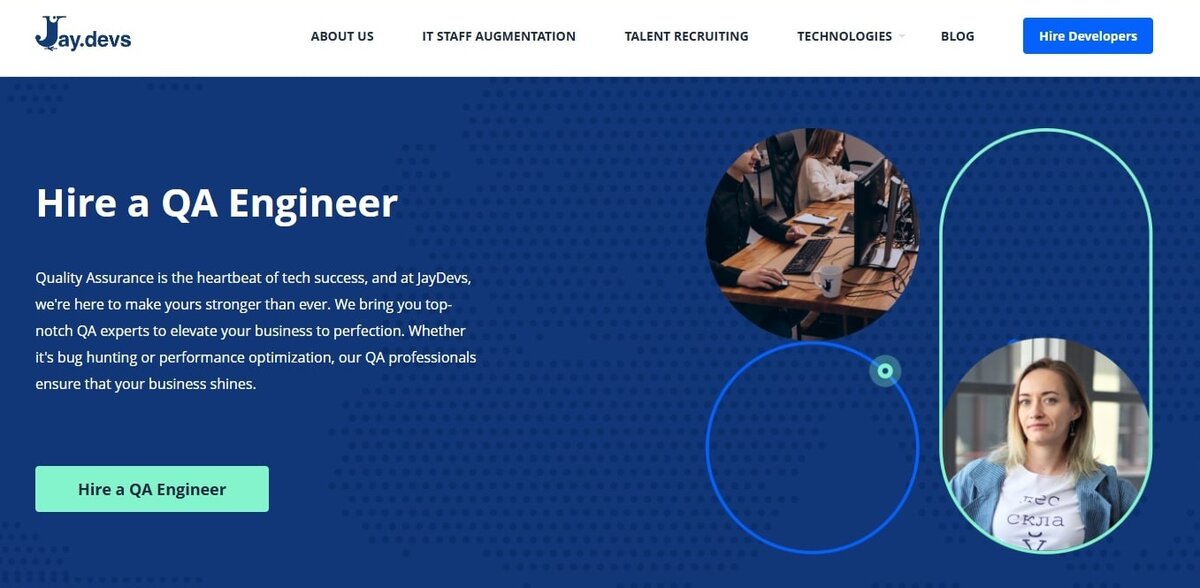
Website: https://jaydevs.com/
Company size: ~250 employees
Founding year: 2017
Headquarters: Vilnius, Lithuania
JayDevs specializes in connecting businesses with QA engineers, with a strong focus on performance testing. Their screening identifies specialists skilled in load testing and scalability analysis who can implement effective performance optimization protocols, ensuring applications maintain speed under varied user loads. Their curated talent pool of 1000+ remote specialists includes certified QA professionals who excel in automated testing, performance monitoring, and quality metrics implementation. Their streamlined recruitment process reduces hiring time by 75%.
The company’s IT staff augmentation model enables rapid deployment of QA teams across multiple tech stacks. Their quality assurance engineers maintain an 80% CV pass rate and contribute to a remarkable 98.8% client retention rate, demonstrating consistently delivering high-performance testing solutions.
Key features:
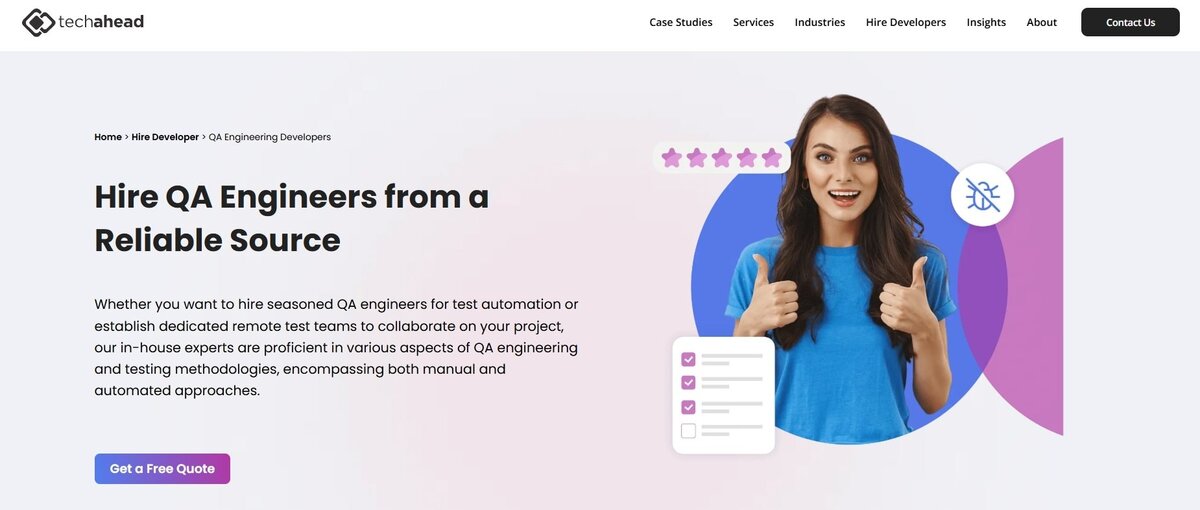
Website: https://www.techaheadcorp.com/
Company size: ~250 employees
Founding year: 2009
Headquarters: Greater Noida, India
TechAhead delivers innovative quality assurance solutions across mobile, web, cloud, AI, and IoT platforms. Their in-house team of 240+ consultants specializes in both manual and automated testing approaches, serving enterprise clients with comprehensive QA engineering and testing methodologies for over 15 years.
The company maintains ISO 27001 certification, ensuring rigorous security standards while operating from dual locations in the US and India. Their proven track record with major brands like Audi, American Express, and Disney stems from their enterprise-ready testing infrastructure and ability to scale testing operations to match complex corporate requirements while maintaining consistent quality across global deployments.
Key features:
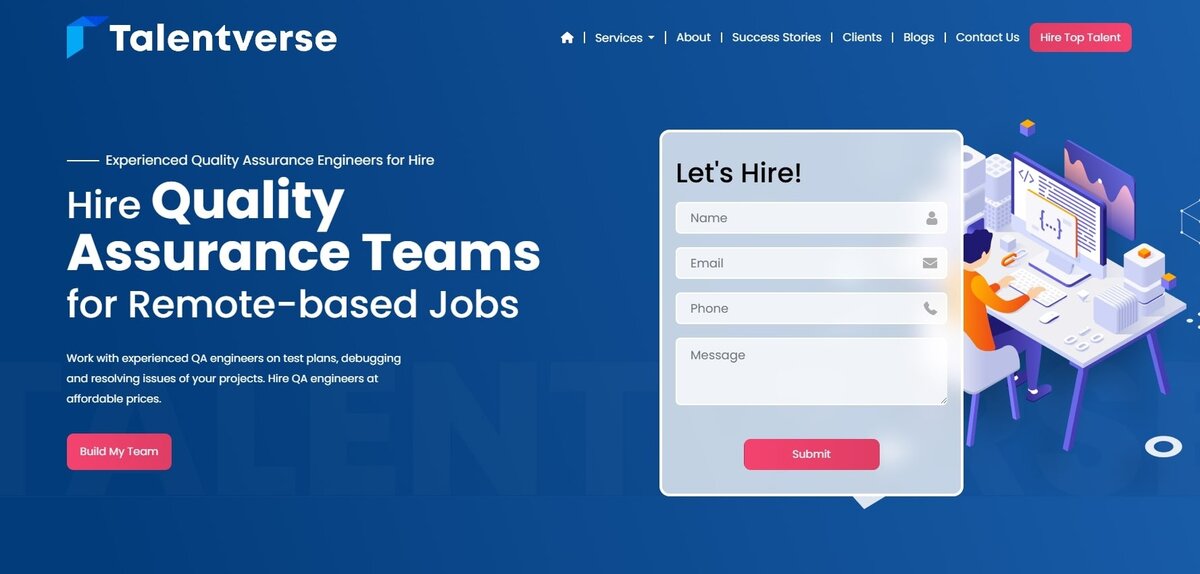
Website: https://www.talentverse.co/
Company size: ~250 employees
Founding year: 2021
Headquarters: Houston, Texas
TalentVerse shapes startup success through its Houston-based recruitment expertise, specializing in connecting early-stage companies with skilled QA talent. Their AI-powered platform streamlines the hiring process, offering startups flexible access to pre-screened QA engineers at competitive rates.
Their comprehensive QA recruitment process includes technical assessments, multiple screening rounds, and skill verification across automated testing tools and SQL. The focus on remote-ready talent makes quality assurance accessible for growing companies.
Key features:
Do you have IT recruitment needs?
Now that we’ve explored the top QA recruitment agencies, let’s look at other options that are worth considering.
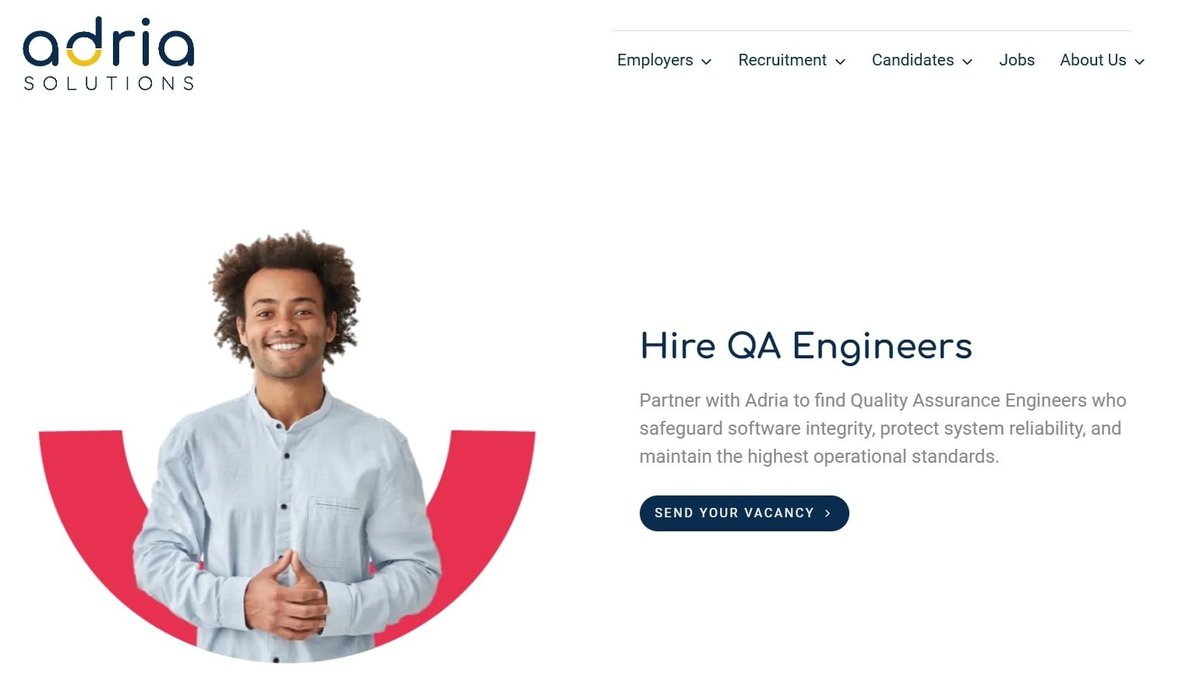
Website: https://www.adriasolutions.co.uk/
Company size: ~50 employees
Founding year: 2004
Headquarters: Poynton, United Kingdom
Specializing in QA engineering recruitment, Adria Solutions leverages data-driven methodologies to revolutionize technical hiring processes. Their proven track record demonstrates an 80% reduction in hiring timelines while maintaining exceptional candidate quality through comprehensive screening protocols.
Their technology-focused recruitment model integrates specialized talent sourcing with deep industry expertise. Adria’s approach encompasses mobile development, cybersecurity, and quality assurance domains, delivering customized recruitment strategies that align with specific organizational requirements.
Key features:
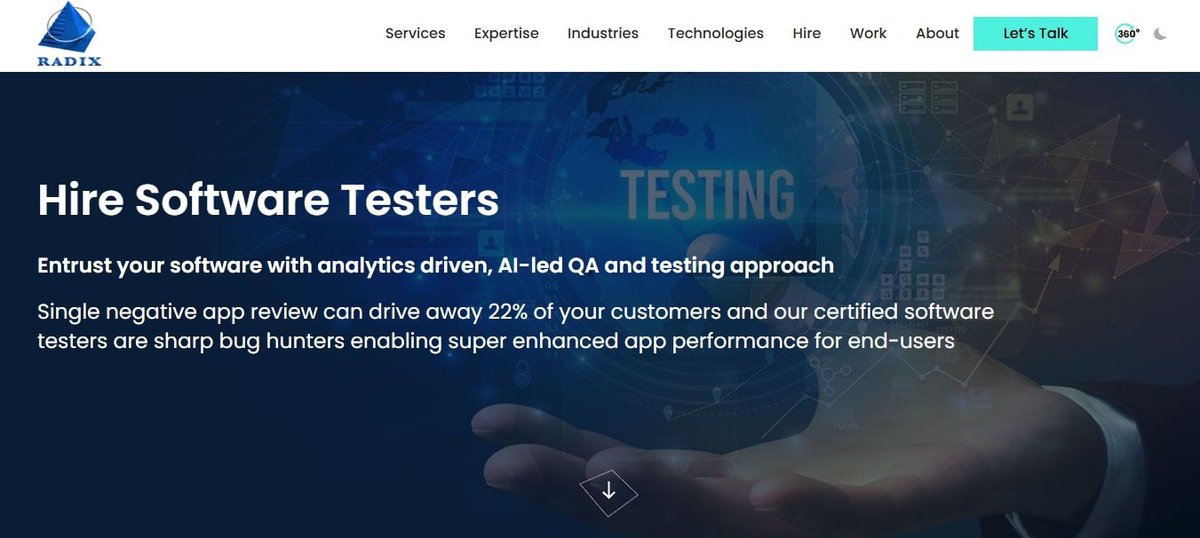
Website: https://radixweb.com/
Company size: ~700 employees
Founding year: 2000
Headquarters: Ahmedabad, India
Radixweb deploys ISTQB-certified QA professionals who implement AI-led testing methodologies across web, mobile, and desktop applications. Radixweb focuses on recruiting QA engineers who specialize in early defect identification, helping clients reduce post-launch issues and maintain product reliability. Their emphasis on sourcing professionals with strong testing fundamentals ensures businesses receive talent capable of minimizing quality risks before release.
Their ecosystem integrates full-cycle quality management with specialized security and accessibility testing. They deliver rapid deployment through analytics-driven approaches and automated testing frameworks while maintaining stringent quality standards across all digital platforms.
Key features:
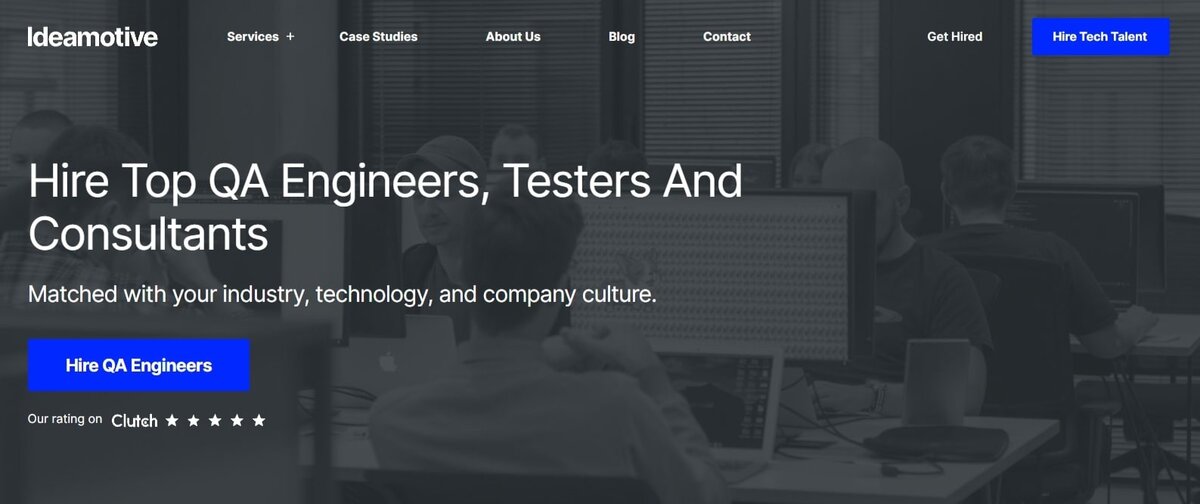
Website: https://www.ideamotive.co/
Company size: ~50 employees
Founding year: 2014
Headquarters: Warsaw, Poland
Through an extensive network of pre-vetted QA professionals across CEE regions, Ideamotive orchestrates rapid talent deployment within 24 hours. Their talent pool combines dedicated quality assurance specialists, freelance experts, and established software partners for precise project alignment.
Their recruitment process combines talent sourcing, onboarding support, and performance oversight into a fully managed solution. This comprehensive approach ensures the seamless integration of QA professionals while maintaining project-specific requirements and cultural alignment.
Key features:
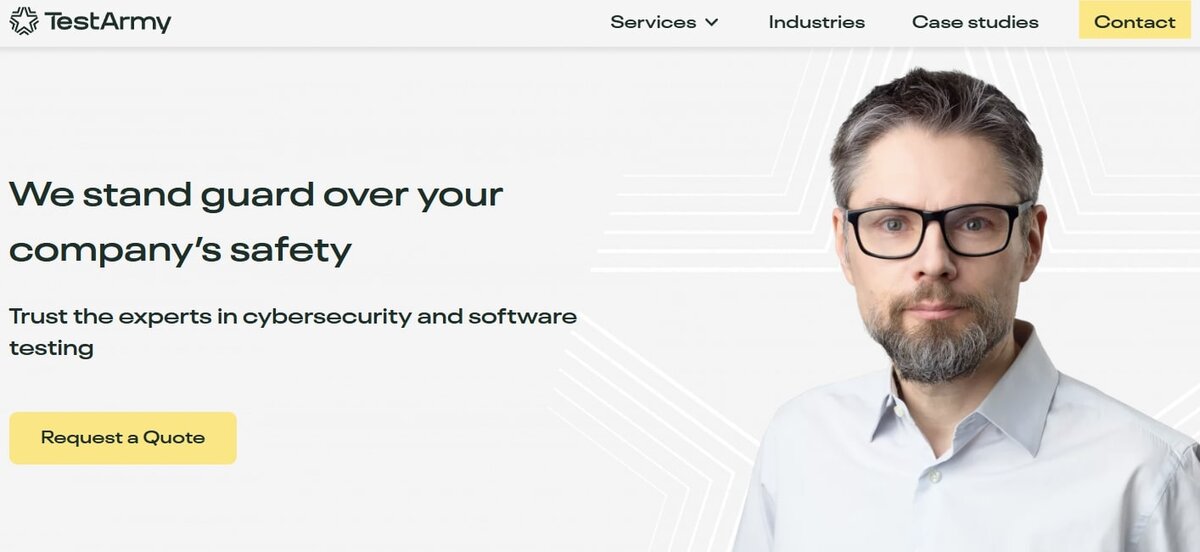
Website: https://testarmy.com/
Company size: ~250 employees
Founding year: 2014
Headquarters: Wroclaw, Poland
TestArmy delivers cybersecurity and software testing services, supporting organizations with comprehensive digital risk management and quality assurance. With over 100 certified IT specialists, the company manages QA recruitment and project-based engagements for banking, fintech, healthcare, and e-commerce clients. TestArmy holds ISTQB Platinum Partner status and complies with ISO 9001 and ISO 27001, reflecting a strong focus on process quality.
Since 2014, TestArmy has completed over 800 projects for many clients, including Philips, Samsung, and Unilever. Their approach covers penetration testing, multiplatform QA, automation, and consulting. With 95% certified professionals, they deliver scalable QA solutions and specialized recruitment of software testers and engineers, enabling clients to accelerate time to market while maintaining high standards of software security and performance.
Key features:
Quality assurance recruitment services play a vital role in modern software development, where finding experienced QA engineers can significantly impact project success and product quality. In this article, we explored the top agencies specializing in QA recruitment and examined key strategies for attracting and retaining quality assurance talent. Among these approaches, partnering with a specialized recruitment agency emerges as the most effective strategy, offering access to pre-vetted candidates and streamlined hiring processes.
“Top-performing engineering leaders have streamlined their hiring processes, reducing the average time-to-fill from 31 to 17 days, demonstrating that efficient recruitment strategies can significantly accelerate team building.”
DevsData LLC combines US-based specialists with international talent networks in their QA recruitment services. Their perfect 5/5 ratings on Clutch and GoodFirms reflect consistent success in connecting businesses with expert QA professionals. With an extensive database of 65000 pre-screened candidates and a selective 6% acceptance rate, DevsData LLC continues to shape QA recruitment through its rigorous vetting process and comprehensive technical assessments.
What sets DevsData LLC apart is its ability to recruit across the full spectrum of QA roles—manual testers, automation engineers, performance specialists, and security testers. Their recruiters understand how to align each candidate’s expertise with a company’s specific testing needs, whether for usability validation in eCommerce, load testing in enterprise applications, or security compliance in finance and healthcare. This versatility is reinforced by a four-stage evaluation system that assesses technical and soft skills through automated screening and expert interviews.
DevsData LLC’s methodology also reflects the strategic hiring practices outlined earlier in this guide. Their approach incorporates the advantages of referral networks, targeted outreach, and deep technical filtering, resulting in candidates who meet technical criteria and integrate well with client teams. Their success fee model, coupled with a 3-month guarantee period, ensures risk-free engagement while maintaining high placement success rates across diverse technical domains.
For specialized QA recruitment solutions, contact DevsData LLC at general@devsdata.com or visit www.devsdata.com.
Frequently asked questions (FAQ)
DevsData – your premium technology partner
DevsData is a boutique tech recruitment and software agency. Develop your software project with veteran engineers or scale up an in-house tech team of developers with relevant industry experience.
Free consultation with a software expert
🎧 Schedule a meeting
FEATURED IN


DevsData LLC is truly exceptional – their backend developers are some of the best I’ve ever worked with.”
Nicholas Johnson
Mentor at YC, serial entrepreneur


 Build your project with our veteran developers
Build your project with our veteran developers
 Explore the benefits of technology recruitment and tailor-made software
Explore the benefits of technology recruitment and tailor-made software
 Learn how to source skilled and experienced software developers
Learn how to source skilled and experienced software developers




Categories: Big data, data analytics | Software and technology | IT recruitment blog | IT in Poland | Content hub (blog)
